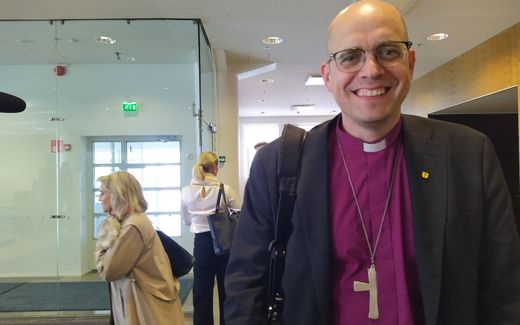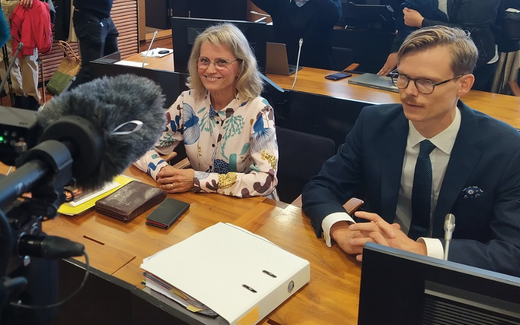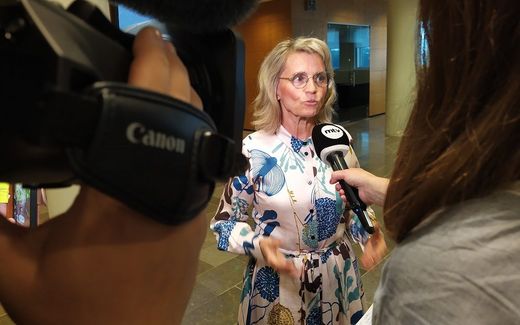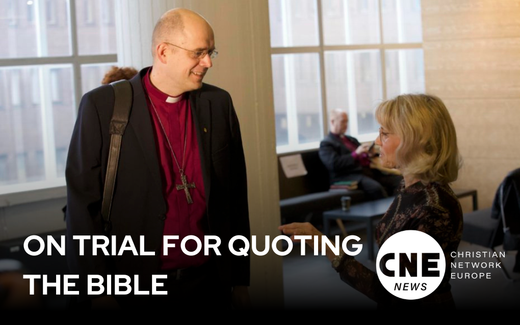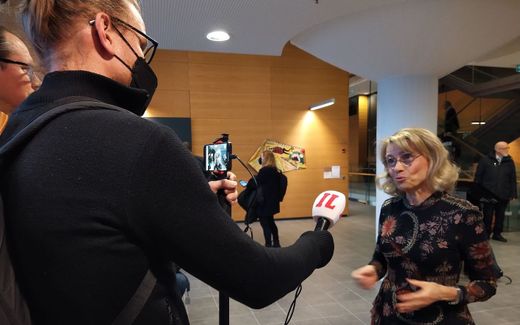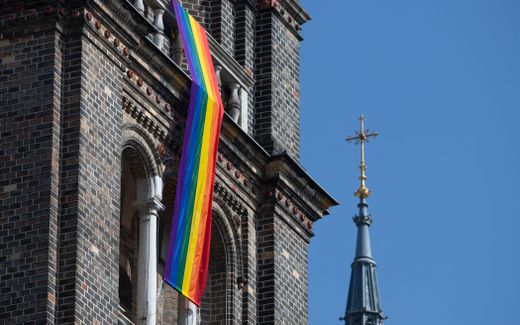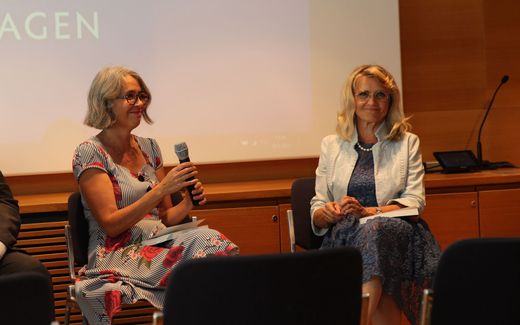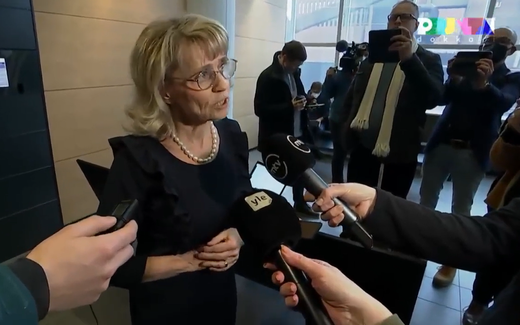Liveblog: Closing statements in Räsänen case (closed)
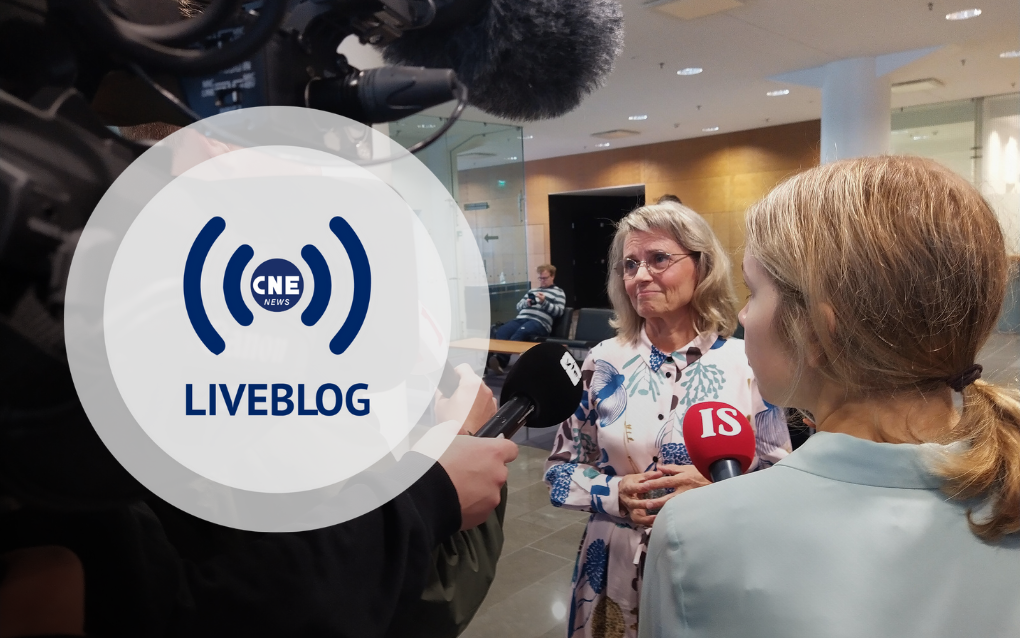
beeld CNE.news
Northern Europe
Finnish politician Päivi Räsänen will stand trial in the Court of Appeal on Thursday and Friday along with Lutheran bishop Juhana Pohjola for allegedly insulting homosexuals. CNE’s correspondent Danielle Miettinen reports directly from the courtroom. (We use Central European Time (CET), which is one hour after the clock in Helsinki, Finland.)
20:00 Wrap-up after two days
A condemnation would have a "devastating" effect on the Church of Finland, bishop Pohjola says in a press conference on Friday evening, together with Räsänen and her team. "Our teaching will come under suspicion. People will leave us to avoid becoming guilty by association."
Read more in the article.
Press conference will follow
Mrs. Päivi Räsänen and bishop Juhana Pohjola will give a press conference around 5 pm (CET) for the foreign press. We will try to report how they look back on the two days in court.
14:35 Closure: verdict before November 30th
The judge announces that the usual 30 days to deliver a verdict cannot be met this time. The date for this will be announced later. But he promises to close the case before November 30th.

14:30 - Radio's legal expert
The legal expert of the public broadcaster Yle, Martina Kronström, says that, officially, the court can order the material to be destroyed. "It does not say that the court must order destruction. Yle is the wrong party to be heard in this matter."
No one is being accused, he says. "It is perfectly clear that no crime has been committed in this case."
Kronström refers to the case at the European Court of Human Rights (ECtHR) in 1994: Jersild vs. Denmark. That case is about a journalist who had been convicted in the national court. But he did not present racist views but rather opposing opinions. "The purpose of the programme hosted by Ruben Stiller was to present various perspectives on current issues. It is essential that citizens know what politicians think so they can decide whom to vote for. This is Yle's mission."
"If there were a judgment in this case, journalists would no longer dare to invite all politicians to live broadcasts. We have presidential elections coming up. Can all candidates be interviewed without the interviewer facing legal problems? The threat of punishment would shift the discussion to social media. In social media, few adhere to journalistic guidelines, and it is difficult to influence the conversation."
Last statement by prosecutor
Prosecutor Mantila presents the sentencing demands. "The longer unlawful writings are displayed, the greater their harmful effects and the more they contribute to discrimination. Keeping such writings on display is particularly reprehensible."
Last statement by defence
Lawyer Sankamo: "The question is very fundamental. We leave the consequences entirely to the discretion of the court."
13:55 Closing round by bishop's defence

Jyrki Anttinen, the defence lawyer of bishop Juhana Pohjola, gives his closing statement.
He highlights the principle of legality in criminal law. "No one may be held guilty of a crime or sentenced to a punishment based on an act that has not been described as a criminal offence."
Anttinen brings up the principle of legality in criminal law. "No one shall be held guilty of a criminal offence or sentenced to punishment for an act which was not punishable by law at the time when it was committed."
This piece of legal theory is relevant, since Räsänen's pamphlet was published before the incitement was a criminal offence.
The interpretation of the Criminal Code is bound by the letter of the law, Anttinen says, and the legislature's intention, the provisions of the Constitution cannot extend the interpretation of the Criminal Code to the detriment of the accused. The titles of a criminal provision or the title of a chapter have no bearing on the constituent elements of the provision or the interpretation of the law.
"There is no hatred or violence associated with the text of the description of the act. Since the legislature did not add discrimination to the constituent elements of the ten amendments to Chapter 11 of the [Finnish] Criminal Code, discrimination cannot be made a constituent element of that provision."
13: 20 Defence of the radio programme

Sankamo proceeds to charge 4: the expressions in the radio programme, late 2019. When you hear the program, the lawyer says, you will not recognise the expression that violates the legal incitement article, unless you deliberately seek it. "When I listened to the program, the accused pair of words passed me by. This type of speech should not be transcribed as it distorts the impression."
Moreover, the accusation contains factual errors. The prosecutor states: "According to the prosecutor, if homosexuality is a genetic trait, it is then a genetic degeneration and a genetic inheritance that causes disease and disorder." But, says the defence, this is not what Räsänen has said, nor what she thinks. "She neither says that homosexuals are inferior. The average listener doesn't detect offensiveness. The speech is legal if a free speech offence is not detectable immediately. Neither of the co-participants has scolded the respondent for offensive comments. In the recording, it can be heard that Räsänen is seeking to clarify his choice of words at the point referred to in the offence description."
It is clear from the context that the criminal threshold has not been met, the defence concludes. "The statements were the result of provocation by the radio show host and were part of a spontaneous and fast-paced conversation."
Short pause in the court's session.
13:14 Criticism of the Pride movement

The defence proceeds by speaking about the gay community and their parades. They cannot be immune to criticism, he says. "No movement has the exclusive right to represent individual minorities. Criticism of a movement cannot automatically be interpreted as being directed at any minority, even if the movement claims to represent one. The Pride parade attracted around 100,000 participants in 2019 and was highly visible in the cityscape. It must be open to criticism."
13:10 Defence of the tweet
Now, Sankamo comes to the tweet from 2019.
In the post, the most weight was in the picture of the Bible verses. The right to profess and propagate faith and a religious text is the absolute interpretative core.
The authorities must be neutral towards religious beliefs. The words shame and sin were comments from the Bible and, therefore, cannot be forbidden.
#kirkko on ilmoittanut olevansa #seta n #Pride2019 virallinen partneri. Miten kirkon oppiperusta, #raamattu sopii yhteen sen kanssa, että häpeä ja synti nostetaan ylpeyden aiheeksi? pic.twitter.com/cnjAQCrOc2
— Päivi Räsänen (@PaiviRasanen) June 17, 2019
Next, the political debate on homosexuality in society: The Marriage Act had to be addressed when the Same-Sex Marriage Bill was tabled. A possible change in the state's understanding of marriage does not make Räsänen's view criminal. The incitement clause is not a right of the victor. A conviction would have a tremendous calming effect on Finnish society.
12:55 - Defence of the Lutheran pamphlet
Now, he continues about Räsänen's brochure. Parliamentary immunity means that a politician has the right to defend his or her reputation against public accusations, says Sankamo. "Räsänen has distributed and disseminated the pamphlet for information purposes; she has defended himself. The Prosecutor General has publicly suggested that the politician's opinion piece is potentially criminal. The most effective way to defend oneself is to publish the text in question."

Any restriction on freedom of expression is always a restriction on democracy, the lawyer states. "If you restrict a politician's right to express his views in parliament, you risk politically motivated prosecution. This is why we need strong protection of a politician's freedom of expression."
The more political and religious the subject, the greater the protection needed. "I am sure many people would like Räsänen to shut up."
Sankamo goes through the prosecution's arguments and refutes them with the same arguments as in the District Court. In the pamphlet, Räsänen says that minorities must be respected. There is no reason to doubt this.
The silencing effect of intervening in the political debate is essential to note. It means that people are afraid to talk about important issues.
Freedom of speech may be interfered with if it threatens violence. The prosecution has taken the accused passages out of context and presented them to the court as a coherent body, which tends to distort the pamphlet's content.
Sankamo: The pamphlet implies that all people are sinners and equal. The concept of psychosexual developmental disorder is still in use. If a court condemned this term, it would confirm a negative connotation that does not belong to it. In freedom of expression offences, statements cannot be separated as individual sentences from their broader context but must be considered as a whole. Sanctions must be necessary in a democratic society. The pamphlet has been available since 2004 and has not led to any legal action or removal requests, the lawyer concludes.
12:45 Appeal session goes to closing statements
Räsänen's lawyer, Matti Sankamo, rejects the referral to Article 8 of the European Convention on Human Rights (ECHR). Since this article speaks about private life versus the state's power, only a person may appeal to this, not the state.

He also rejects the referral to Article 17 of the same convention about prohibiting abuse of rights. This article applies to extremist movements. This is not applicable, Sankamo says.
Further, the defence has the impression that the prosecutor gives discrimination precedence over freedom of expression and religion. He says that is legally not okay. "Freedom of expression also protects expressions that may be considered offensive, shocking or worrying. The [Finnish] Constitution and the European Convention on Human Rights provide a strong basis for freedom of religious and other beliefs."
The legal exercise of freedom of expression and religion is the next topic. The Supreme Court and the European Court of Human Rights have adopted elements that emphasise the role of freedom of expression and religion. The statements are linked to issues of public interest. "Political speech enjoys the strongest protection of freedom of expression. Freedom of expression is particularly important for elected officials. The protection of freedom of expression for opposition politicians has been strengthened."
Sankamo is talking about the article on incitement. "This includes threatening, slandering or insulting. The charges did not involve threats. Discrimination is a secondary issue, not included in the offence."
Then, the defence goes to the so-called Incitement Article 11.10 of the Finnish Penal Code. Sankamo: "This law was not intended to restrict discussion of matters of social importance. Restrictions of this type must be treated more strictly than restrictions on other types of speech. If an expression is not manifestly contrary to the article on incitement, it is legal. There must be a clear intention to insult or offend."
10:59 - Break until 12 o'clock (1 o'clock in Helsinki)

10:55 - If Räsänen would love gays, she would have acted differently
If Räsänen indeed loves homosexuals and accepts them, she would have done something else. "She would allow the same rights to them as to other people. She would accept their same-sex sexual conduct. Both of the accused must have understood the insulting nature of their expressions. They must have understood that their utterances are likely to cause contempt, discrimination and hatred toward homosexuals."
Räsänen claims to speak to the church and the homosexuals and that she has no political motivation, the prosecutor says. "But the accused have attempted as much media coverage as possible. They have tried to strengthen negative attitudes. That makes the deeds very reprehensible."
The prosecutor demands the penalty of forfeiture. Practically speaking, this means deleting certain parts of the radio programme and the pamphlet.
10:25 - What is hate speech?
After the break, prosecutor Anu Mantila comes back to the basic question: What is hate speech? From earlier court cases of a similar nature, it was clear that a condemnation does not require incitement to hate and violence. "Insult is bad enough to be condemned."
According to Mantila, religious beliefs do not give the right to insult or speak malicious speech. "Everyone may believe anything he or she likes. But uttering discriminating speech is not protected by law. There is material in the Bible that contradicts principles in our society. This is why the interpretation of the law against discrimination must be applied effectively."
Insulting hate speech is very harmful to sexual minorities, Mantila says. And to require celibacy is insulting. "It is against the law of equality."
And about the booklet; that has been re-published without revision of the text, although it contains wrong information.
She replies to the accusation on Thursday from Räsänen's lawyer, Mr. Matti Sankamo, that the prosecutor was on the brink of lying. "This is dangerous but also interesting. We cannot speak about lying when the uttering is an interpretation. Interpreting is a normal conduct."
09:40 - Break until 10 am (CET)
The judges initially wanted to take a break until 10:50, but the prosecutor asked to extend the break to 11. It wants more time to think through the closing statements.
09:35 - Pohjola questioned
Bishop Pohjola's attorney, Mr. Jyrki Anttinen, now interrogates Mr. Pohjola. The Bishop tells about the process of producing the pamphlet. "It surprises me that the prosecutor does not give weight to the theological nature of the pamphlet."
Pohjola repeats previous utterances: "The core of the whole process is this: condemning sinful deeds does not mean questioning the person's worth and dignity. These are completely different things. The prosecutor is propagating an understanding that is fully against the Christian understanding of human being, God and their relation. Condemning sin is not questioning the person's dignity."
09:30 - Räsänen accuses prosecutor of insult
Räsänen explains to the prosecutor the Christian creation theology. She says, it has been very harmful for her that the prosecutor has brought to the media a false accusation that Räsänen does not think that all people are created by God and in His image. International media has published this, and Räsänen has had to try to correct this. People have been wondering what kind of a person this is who tells being a Christian but does not believe that all people are equally created by God. "This claim of the prosecutor has insulted me."
09:20 - Questions from prosecutor about homosexuality

In the cross-examination, prosecutor Anu Mantila questions Räsänen about the nature of homosexuality. "You wrote that homosexuality is a psychosexual developmental disorder. How can you, as a doctor, express this kind of outdated thinking?"
Räsänen says she is no longer working as a doctor, since she is a member of the parliament now. But, she adds: "There are different opinions about how homosexuality emerges. In the classification of diagnostics, which the doctors use every day, there are these diagnoses: psychosexual developmental disorder, oneself disturbing sexual orientation. If the prosecutor accuses me of this, she must raise an accusation against this diagnostic classification."
About the pamphlet, the prosecutor follows the accusation of the paedophilia connection that she made earlier. "You write about men abusing boys. Do you mean that homosexual men are a threat to boys, and that they have a tendency to paedophilia?"
Räsänen: "I did not write that. I meant that children are vulnerable to abuse in general because of the cultural change in sexual attitudes and education."
09:10 - Questions about the radio programme
As a well-known Christian, Räsänen was invited to Ruben Stiller's radio show. This would be about Christmas. Räsänen was also a member of the board of the public broadcaster Yle, so this invitation was not strange.
Shortly before the live broadcast, the subject was changed to homosexuality.
08:50 - Questions about the tweet
Mr. Sankamo now questions Mrs. Räsänen about the postings on Twitter and Facebook in 2019, what started the whole case. She explains: "In my local Lutheran congregation, there was discussion about whether the congregation should be part of the Pride Parade. The (national, ed.) church as a whole was also taking part. I was anxious about this and wondering what to do. We were planning with some others who were worried about the situation, to discuss this with our Lutheran bishop. But since the church as a whole was taking part, that did not help. Then I decided to write the tweet with the picture of Romans 1:24-27."
#kirkko on ilmoittanut olevansa #seta n #Pride2019 virallinen partneri. Miten kirkon oppiperusta, #raamattu sopii yhteen sen kanssa, että häpeä ja synti nostetaan ylpeyden aiheeksi? pic.twitter.com/cnjAQCrOc2
— Päivi Räsänen (@PaiviRasanen) June 17, 2019
08:40 - Questions about changing sexual orientation

In the oral questioning by her lawyer, Mrs. Räsänen says that she was taught during her medical studies at the university in Helsinki that homosexuality was a "psychological disorder". "When I wrote the pamphlet, this was my understanding", she said on Friday morning, shortly after the opening of the session. One of her teachers was Kalle Achte; one of the most valued psychiatric doctors of that time. "His opinions have not been criminalised."
About conversion therapy, Räsänen says: "I know homosexual people who have been helped through therapy and counselling. I'm talking here about having received spiritual support. I have nothing to do with the so-called conversion therapy. But even if I had, I want to emphasise, that there is no legislation that criminalises conversion therapy. There might be a bill coming to the parliament, and as a member of parliament I must have the right to speak about this and promote my opinion, whatever it would be."
Räsänen says she has written in her booklet that there was no research showing that homosexuality is genetic.
She decided to write the booklet "Male and female He created them" because of the culture in Finland. "I was worried as a Member of Parliament and mother about the sexual education at schools. My son came home from school with material that said that you do not need to be in love to have sex, and that it is okay to have sex in short romances." Räsänen feared, this endangered them to sexual abuse.
The Luther Mission Foundation asked her to write the brochure. It was written for people in the church congregations. They needed material for the upcoming change. One motivation was to help churches to welcome people with affectionate feelings towards others of the same sex. During those times, shortly after 2000, there was also a political debate about changing the marriage act. This had an impact on the marriage understanding within the Lutheran Church of Finland.
08:11 - Oral examinations start
The hearing starts. Räsänen's lawyer, Mr Sankamo, starts questioning his client. Räsänen talks about the origin of the pamphlet. According to her, the idea for a pamphlet arose when there was debate in Finland around marriage laws.

07:55 - Pohjola and Räsänen have arrived
Bishop Juhana Pohjola and Päivi Räsänen have arrived in the court.

07:48 - Supporters wait for Räsänen
Like yesterday, people are backing Räsänen in front of the court. They are waiting for the Finnish politician's arrival.

07:44 - No camera's during the trial
It is strictly forbidden to make photographs or videos during the hearings. However, Mrs. Räsänen states on Twitter that she would have liked it differently. "The prosecution did not agree that the hearings were streamed, I don't know why. It would have benefited the judges and the defendants. In terms of freedom of expression, it would have been important."
Istunnon toinen päivä hovioikeudessa. Kello 9 alkaen minun kuulustelut. Syyttäjä ei suostunut siihen, että istunnot olisi Streamattu, en tiedä miksi. Tuomareille ja syytetyille se olisi sopinut. Sananvapauden kannalta olisi ollut tärkeää.
— Päivi Räsänen (@PaiviRasanen) September 1, 2023
07:33 - Helsinki awaits second day of hearing in Räsänen case
Good morning from Helsinki! The second day of the session includes oral examinations on the programme. After the first day of court yesterday afternoon, Räsänen's lawyer, Matti Sankamo, was still reckoning with a possible third day of court.
The defendants are scheduled to arrive shortly before 8 am CET.
Recapturing the first day of hearings
The first day of session consisted mainly of the presentation of written evidence. CNE wrote several articles about it.
16:00 Session paused
The session in the Court of Appeal in Helsinki is closed for Thursday. On Friday, the court opens again at 8 o'clock (9 o'clock local time). CNE will continue this liveblog then.
15:52 - Defence disappointed in prosecutor
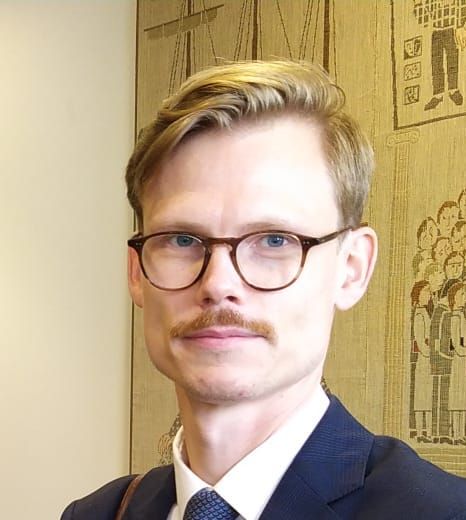
Räsänen's lawyer, Matti Sankamo, is disappointed in the performance of the prosecutor. "This is much the same as we have heard in the District Court (last year, ed.)" He does not see many new insights from a legal point of view.
Tomorrow the case goes on. Sankamo thinks it possible that a third day is needed.
15:37 - Excerpts from radio interview
Räsänen was invited to this satirical radio programme by the presenter Ruben Stiller and expected that she had to speak about Christmas and the birth of Jesus. But suddenly, it was about the question: What would Jesus say about homosexuality?
In the courtroom, Ruben Stiller says on tape: "We do not know if Jesus was homo, hetero or trans person. How can it be said that homosexuality is against the order of creation? 1500 species are found to have homosexual conduct."
Räsänen answers: "God did not in the beginning create homosexuality. He created man and woman to have sex in marriage."
Ruben Stiller: "Sex outside marriage is a sin. What is more sinful, to lie around with many people, or have homosexual sex?"
Räsänen: "We are sinners, also in the area of sexuality."
15:11 - Listening to the radio in the courtroom
The attention now shifts to the radio programme in which Räsänen spoke in 2019 and in which she repeated her ideas about sexual ethics. Although the prosecutors do not want to listen to it in the courtroom, the defence insists on listening to excerpts.
The launch of the satirical programme causes hilarity among the assembled press.
14:43 - Bible text on display
After the break, Mr. Sankamo, Räsänens attorney, starts discussing the tweet Räsänen sent in 2019. In it, she criticised the Lutheran Church for participating in a pride march. According to Mr. Sankamo, the Bible text is the problem.
Räsänens defence also brings up the open letter Räsänen wrote to the archbishop, in which she expressed her concerns. "This shows the context of the tweet", Mr. Sankamo states.
14:15 - Pohjola: Saddened by court case

Bishop Juhana Pohjola is not surprised by the current state of affairs. "These are the same arguments. The prosecutor did speak very broadly, but the content is the same."
Pohjola added that he feels saddened by the court case. "The prosecutor sees traditional Christianity as containing hatred and discrimination. No value is given to the Biblical revelation that all people have intrinsic value as God's creation."
14:10 - Break until 14:20
13:22 - Prosecutor and defence debate evidence
The prosecutor argues that things like the pamphlet are causing stress among young homosexuals. According to the prosecutor, these people are more often depressed and suicidal. "In the past, this kind of results were explained with mental problems. Now we know better."
Mr. Sankamo, Räsänens attorney, replies that it is known that sexual minorities are not doing well. However, he questions what arguments like these have to do with the case.
13:08 Focus on the pamphlet
The prosecutor and the defence concentrate on the 2004 pamphlet. From the prosecutor's office, Krista Mannerhovi shows that the booklet is still available on the website of the Luther Mission Diocese (Lähetyshiippakunta), of which bishop Juhana Pohjola is the director.
Mannerhovi adds that the Finnish Institute for Health and Welfare says: There are no grounds to hold homosexuality anything but a normal variation of human sexuality. To label homosexuality as a disturbance is very harmful.
The prosecutor concludes: To make homosexuality a psychological distortion is not an opinion but a lie. It is insulting.
Räsänen's defence lawyer, Matti Sankamo, says the brochure was outdated. But re-publication online was necessary because of the prosecutor's many wrong statements about it.
Sankamo said that his client has never defended the so-called conversion therapy. However, it would be legal to do so since it has never been criminalised in Finnish law.
12:54 - Summary of Thursday morning
Insulting, derogatory and humiliating. These are the characterisations of the Finnish prosecutor on Thursday morning in the appeal case against Päivi Räsänen. Read the full summary via the link below.
12:45 - Attorneys defend pamphlet
The pamphlet is now being discussed. Räsänens attorney, Sankamo, highlights the sentence in the brochure that says that "according to Christian understanding of the human being everyone is equal and the sexual orientation does not change it."
Pohjola's attorney adds that the pamphlet's title (Male and Female He created them) is taken from the Bible. "This means that it argues on the grounds of Christian understanding of human beings." Anttinen adds that it says in the pamphlet that "there is no one who is whole. We are all broken in our sexuality."
12:30 - Lunch break over, review of evidence begins
With the lunch break, the Court of Appeal will now examine the evidence. It became clear this morning that both the defence and prosecutors will present new evidence.
11:16 - Räsänen: Sin is a central theme

After the court session was suspended, Päivi Räsänen spoke to various media outlets. In a reaction to the first hours of the session, the Finnish politician says that the concept of sin was much spoken about. "I am also a sinner. Sinfulness does not mean that one has less value. If so, the whole concept of grace would be swept aside."
11:15 - Lunch break
There is now a lunch break until 12:15 CET.
11:07 - Broadcast does not want to remove episode
After Pohjola's turn, it was time for the attorney of the Finnish public broadcaster YLE, who aired the radio program. The prosecutor wants the broadcaster to delete the episode with Räsänen.
According to the radio station, this broadcast does not meet the grounds for the removal order (illegality and necessity)."The programme's purpose was to critically discuss the opinions that Räsänen had previously expressed publicly, which differed from the majority opinion."
According to the defence, the radio station cannot remove an episode over the responsible editor.
11:02 - Pohjola's attorney speaks
Now, it is Bishop Juhana Pohjola's attorney's turn. According to attorney Jyrki Anttinen, the prosecution has not explained why Pohjola is accused of a 2004 pamphlet. "This violates the ban on retroactive criminal law," he said. According to Anttinen, a person can only be found guilty if that act is specifically prescribed as punishable by law.
Anttinen argues that this charge demands punishment not only on the basis of the crime of sedition but also on the basis of the constitution. "I have never seen a criminal case prosecuted on the basis of the Constitution," he said.
10:42 - Defence: The prosecutor is only one who does not understand the radio program
Mr. Sankamo now moves on to the radio program. The radio program was, according to the defence, "very provocative, the style was amusinga and vulnerable. The name is provocative: What does Jesus think of homosexuals? Räsänen did not choose it."
Sankamo explains that Räsänen was invited to speak about the message of Christmas. But then the subject suddenly changed. "Räsänen was critisicing the theme change a little in the beginning. During the discussion, there were also people present with opposing views. When you listen to it is very odd that a prosecution rose of this."
Again, it is only the accuser who has not understood, Sankamo argues. "The [public broadcaster] YLE has not commented on it, neither has there been much feedback from the public. Only the prosecutor misunderstood the program."
10:35 - Defence: Tweet is part of a larger discussion
Mr. Sankamo now moves to the tweet. According to him, the tweet was part of a larger discussion about understanding Christian sexual ethics. "The tweet was not meant to discriminate, but to influence social debate."
In addition, the defence points to Twitter's technical limitations. "The character limit required snappy communication at the time; outlining a broader background was impossible."
10:29 - Defence: Prosecutor has a political agenda
According to Mr. Sankamo, the prosecutor has a political agenda. The prosecution has argued that the section on sedition was met in part because Räsänen criticised the church for its participation in political activities. Unfortunately, we can easily infer from this the prosecution's political position on whether the church should participate in the Pride event.
The defence attorney further states that this is a historic trial. "The prosecutor said that in the pamphlet, it is said that homosexuals are equal and we have to stand for their human rights. And still, she accuses Mrs Räsänen of propagating against her own statements in the pamphlet."
10:21 - Defence: Pamphlet is only being misunderstood by two persons
The defence now elaborates on the pamphlet. According to Mr. Sankamo, this pamphlet never caused problems until it appeared in this trial. "There are only two persons who have misunderstood it: the person who made the report of the offence and the prosecutor."
According to Sankamo, Räsänen does not need to defend the outdated scientific parts of the pamphlet, which was published in 2004.
10:15 - Break over, defence is given the floor
With the break over, the floor has been given to the defence. Matti Sankamos states that the prosecutor has given an end statement, which is not according to the lawful procedure. "In my opinion, this does not meet the criteria of a fair trial. The courtroom should allow a fair trial for the defence."
Mr. Sankamo, Mrs. Räsänens's attorney, says that the prosecutor makes characterisations. "General unmorality of homosexuals is the expression of the prosecutor. Räsänen has not said anything like this." According to the defence, Mrs Räsänen believes all rights belong to all people. "Thís is Mrs Räsänens opinion. The prosecutor is lying. We should abide in truth."
10:00 Speaking about religion before the break
The freedom of religion, the prosecutor says, is not expanding the freedom of speech. It does not give rights that other people do not have.
To speak about sin and shame in a religious context can even be more harmful because it brings matters in contact with the authority of God.
The prosecutor states clearly that we are not speaking about religion but about expressions. The state cannot verify if there is a God. People have the right to describe for themselves whether they are homosexuals, and the state has to protect that right since sexual rights are human rights.
The point by Päivi Räsänen that God created homosexuals but that people somehow became homosexuals means that they are inferior, says the prosecutor.
Räsänen remarks: The prosecutor is repeating the same claims that have been turned down already by the District Court.
Prosecutor: The insulting statements are against the truth. And the expressions are repeated.
The court takes a break.
09:43 - Against gay therapy
The prosecutor focuses on the "development" part of the sexual identity. To state that homosexuality is a "developmental disorder", as Räsänen does in the booklet from 2004, is not an opinion but an insulting and untrue statement.
In the booklet, Räsänen wrote too that homosexual orientation is not always permanent. According to Mantila, this makes room for gay therapy, which is rejected worldwide as harmful. For this reason, Finland has a citizens' initiative to ban this too.
The prosecutor answers that Räsänen is contradicting herself in her pamphlet. On the one hand, it says that homosexuals have to be loved and respected. But on the other hand, there is no ground for this if it also says that their sexuality is wrong. And this is extra vulnerable since the sexual identity is the core of the human being. To say that homosexuality is a sin breaks the identity of these people.
The prosecutor denies that the quotations are taken out of context. If all the expressions are collected and put together, it is clear that they are denigrating homosexuals. It connects homosexuality with a general immorality, which is insulting.
09:37 - Watch Räsänen being welcomed at the court
Räsänen was welcomed by her supporters waiting for her in front of the court.
CNE.news
09:21 - Pohjola: Confident about the case
Bishop Juhana Pohjola, earlier interviewed by CNE, states to ADF International that he is very confident about the case. "I look forward to presenting our case."
“I’m feeling confident” says Bishop Juhana Pohjola as he heads into court to defend free speech. #FreeSpeechOnTrial pic.twitter.com/vJsQaP7v6O
— Sofia Hoerder (@HoerderSofia) August 31, 2023
CNE.news
09:18 - Accusations from the prosecutor
One of the prosecutors, Anu Mantila, states that it is usual that religion is used to speak against homosexuality. But this can be hate speech, she says, and incitement to discrimination is a serious crime. Everything that violates human equality and dignity is insulting. To protect vulnerable groups, the state must punish this. That is not limiting the freedom of expression, but it is to protect the dignity of homosexuals.
According to the prosecutor, there is no doubt that Räsänen's expressions were insulting in all three charges. The politician might say that she spoke in a sober style and genre, but this is not decisive. Räsänen used the words "abnormality, developmental disorder, abnormal sexual variation, abnormal." These words are derogatory. "I have not heard Räsänen re-formulating these words", says the prosecutor.
She refers to the case "Beizaras and Levickas" from the European Court of Human Rights (ECtHR) in Strasbourg. According to the prosecutor, Anu Mantila, her presentation is in line with that.
According to the CNE correspondent Danielle Miettinen in the courtroom, prosecutor Mantila is speaking much calmer today than last year in the District Court.
09:13 - Sin
An associate professor at the University of Helsinki, Timo Eskola, has studied the prosecution's 26-page appeal. He believes that it is the concept of sin that the prosecution will now base the appeal on. This reports the Norwegian daily Dagen As the district court has already rejected what Päivi Räsänen has said or written is illegal, the accusation must be directed against her religious views.
"The prosecution will argue that even if the Christian politician does not insult individual homosexual persons, or say that they are inferior, then to say that homosexual acts are a sin, in itself, is offensive and deprives homosexual persons of their human dignity", the professor states. "If this argument were to prevail, the Christian Church's understanding of sin would, therefore, become illegal in Finland." The fact that this is part of Christian teaching does not remove the degrading aspect, claims the prosecution in the appeal.
08:53 - Starting with the state of affairs
At the beginning, the court looks at the state of affairs. The judge refers to the District Court's verdict, which rejected the charges in March 2022.
Räsänen thinks the District Court was correct, and the Court of Appeal should also reject the charges. The prosecutor, however, still thinks Räsänen's expressions are an example of hate speech against homosexuals. The prosecutor comes with the same demands: Räsänen and Pohjola must pay a fine, and the broadcaster Yle must delete the recording of a radio program from 2019 in which Räsänen spoke about homosexuality and Jesus.
Räsänen's lawyer Matti Sankamo complains to the judge that the prosecutor is speaking too long. He asks them to speak shorter, "otherwise the conduct goes against the law."
08:41 - State Prosecutor considers trial "socially significant"
According to the State Prosecutor, Mrs. Anu Mantila, the trial is socially significant. She says so to the public broadcaster Yle. "The issue is especially the non-discrimination of sexual minorities, their right to live in this society as equals with other groups. In this trial, at least two strong basic rights are at odds, freedom of speech and non-discrimination", she says. "We believe that Räsänen's statements cited in the indictment violate the human dignity and equality of homosexuals and are degrading to them. In addition, we consider that we have presented convincing legal arguments to support the charge."
08:28 - Twitter thoughts on the Räsänen case
Ms Räsänen's defence is being assisted by Alliance Defending Freedom's international arm, ADF International. This is a Christian legal advocacy organisation based in Vienna. Its executive director, Paul Coleman, shared on X (or Twitter) a few thoughts on the case.
Tomorrow brings round two of #FreeSpeechOnTrial as longstanding member of the Finnish Parliament,@PaiviRasanen, and Bishop Pohjola face criminal prosecution for "hate speech" i.e heresy against the secular orthodoxies of our day. Here's 10 things you might not know ... #thread?
— Paul Coleman (@Paul_B_Coleman) August 30, 2023
08:24 - Opening court case
The judge reads the charges, of discrimination and hatred against homosexuals. The prosecutor, Arto Perälä, opens the statement: Päivi Räsänen has shown hatred towards homosexuals. That cannot be accepted in the boundaries of freedom of speech.
08:14 - Accused is ready in courtroom
Finnish journalist Santeri Marjokorpi shared a photograph of Räsänen, waiting with her lawyer in the courtroom.

08:11 - Public broadcaster also present

There is also a reporter from the Finnish broadcaster Yle present at the court. Noteworthy: she carries a keycord with the rainbow colours. The reporter states, however, that she always carries this keycord and that she is not carrying this on purpose.
08:05 Call to action for Christians

Many Christian media give attention to the court case in Finland. On Evangelical Focus Jeff Fountain calls all Christians to "awaken to the intensity and pace at which secular intolerance is progressing".
He sees that expressions of faith are "increasingly censored" in the public square. "Secular intolerance is likely to increase as secularisation and dechristianisation continues in Europe", the director of the Schuman Centre for European Studies writes.
08:00 - Waiting for trial to start
Those present at the trial are now waiting in a corridor for the courtroom to be opened.
CNE.news
07:38 - No new insights expected

One of the main questions of today is whether the prosecutor will have new insights, after having failed last year in the District Court. The Finnish Christian web source Seurakuntalainen quoted on Wednesday Räsänen's lawyer, the deputy judge Matti Sankamo. He said he didn't expect any new visions. "Nothing has changed in the matter; the session will probably be very similar. We already know more or less what the prosecutor will present. Although we develop our own arguments, the question is a matter of principle", says Sankamo.
07:31 - Räsänen: If I would be found guilty, that would be persecution
In a statement to the press, Mrs Räsänen states that she trusts that the outcome of the trial will protect the freedom of religion and speech. "Now it is time to use our freedom, we should not censor ourselves. I encourage everyone to speak out about one's faith. I am not so much interested in what causes homosexuality, God decides what is sin. My main message is that God loves us sinners and wants to save us into eternal life."
Räsänen further states that "if I would be found guilty, that would be persecution and would see many Christian books burning."
Danielle Miettinen
07:22 Räsänen arrives at court

Mrs Räsänen has arrived at the courthouse in Helsinki. She is now talking with various media outlets.
It was not a given that Räsänen would be present today. Earlier this week, she shared on Twitter that she is on sick leave due to a sciatica diagnosis.
CNE.news
07:15 - Demonstrators gather for show of support for Räsänen

Lutheran pastor Antti Kroos and retired assistant Hilkka Kiivuori are waiting for the support demonstration for Räsänen and Pohjola to start.
Kroos: I want to support Päivi because she stands for the traditional understanding of the Christian faith. I am also worried as a pastor about my own freedom of speech. The whole case is a farce. The law should be changed to describe more carefully what hate speech means.

Danielle Miettinen
06:56 - Prosecutor's argument for appeal
Both sides are preparing to guard and protect fundamental rights today in the unique law case in the Court of Appeal. Below is the prosecutor's argument for the appeal.
Leave for further proceedings must be granted to resolve the legal question referred to below so that there is a higher court decision guiding the case law and the authorities' action in other similar cases concerning the application of the law.
The question in the case is when expressions must be considered offensive within the provision's meaning, i.e. when they constitute punishable hate speech that exceeds the limits of freedom of expression. More specifically, the question is where the line is drawn between punishable and non-punishable expression in the case of hate speech, which is less serious than incitement to violence or the threat thereof and which is directed against a group of persons within the provision's meaning. In a case such as this, how is it possible to weigh fundamental rights where there is a conflict between equality, human dignity, the protection of honour and privacy and the right to self-determination on the one hand, and freedom of expression and religion on the other? It is important to obtain the opinion of the Court of Appeal on this question of interpretation and balancing of the law.
In addition, leave for further proceedings must be granted because there is reason to doubt the correctness of the outcome of the District Court's decision. There is reason to suspect that the District Court, in dismissing the charges, misapplied the incitement offence provision by setting the threshold for punishable hate speech overly high. The Court misinterpreted the offensive element of the incitement offence provision and wrongly held that the provision requires intentionality.
Danielle Miettinen
06:48 - Prosecutor claims court "did not understand Räsänen's writings"
Although the court dismissed all charges in an earlier case, the prosecutor is still appealing. Namely, it argues that the court "did not fully understand" Räsänen's expressions.
"In its interpretation and weighing, the district court has not taken into account at all the right of homosexuals to the protection of honour and private life and the protection of human autonomy that belongs to it, the prosecutors state in their appeal to the Court of Appeal."
From the beginning, Räsänen has denied that she committed crimes or denigrated homosexuals by calling for freedom of speech and religion. Now in court, Räsänen demands that the court reject the prosecutors' appeal and that the district court's verdict remain permanent.
The prosecutors, meanwhile, demand in court that Räsänen be sentenced to a 120-day fine for three counts of incitement against a national group.
CNE.news
06:35 - International support for Finnish Christians
The Finnish court case is attracting international interest. Some 500 people, for instance, demonstrated in front of the Finnish embassy in the Hungarian capital, Budapest. There, they read the Bible and prayed for Räsänen and Pohjola.
Furthermore, the Christian lobby group Christian Council International collected over 2,500 messages of support addressed to Räsänen. Among others, MEP Bert Jan Ruissen of the Dutch Reformed SGP party expressed his support for the Finnish politician.
Vanavond in het #EuropeesParlement bekrachtigde @hjaruissen van @SGPnieuws met persoonlijke handtekening de oproep tot steunbetuiging aan @PaiviRasanen. Nu 2.460 ondertekeningen in 10 dagen. Ik wil Päivi donderdag a.s. +2.500 aanbieden. Teken en steun ook: https://t.co/lMFQxSlDbh pic.twitter.com/lTF4JdW4Pr
— HenkJanvanSchothorst (@tccouncilorg) August 29, 2023
CNE.news
06:22 - Bishop Pohjola feels strengthened by prayer
Although most of the attention is on Räsänen, she is not alone on trial. The Lutheran bishop Juhana Pohjola must also answer in court because, as editor-in-chief, he was the publisher of the brochure written by Räsänen, which came out in 2004. In a video interview with CNE, Pohjola looks ahead to the court case. He says he feels strengthened by the prayers of fellow Christians. "I know we will not stand there alone, in our own wisdom and strength," he says.
CNE.news
06:15 - What is the case about?
More than a year after Räsänen and Pohjola were acquitted of all charges, they are in court again. This time, it was an appeal because the prosecution disagreed with the first verdict. Evert van Vlastuin wrote an explainer on the current state of affairs.
CNE.news
Related Articles


